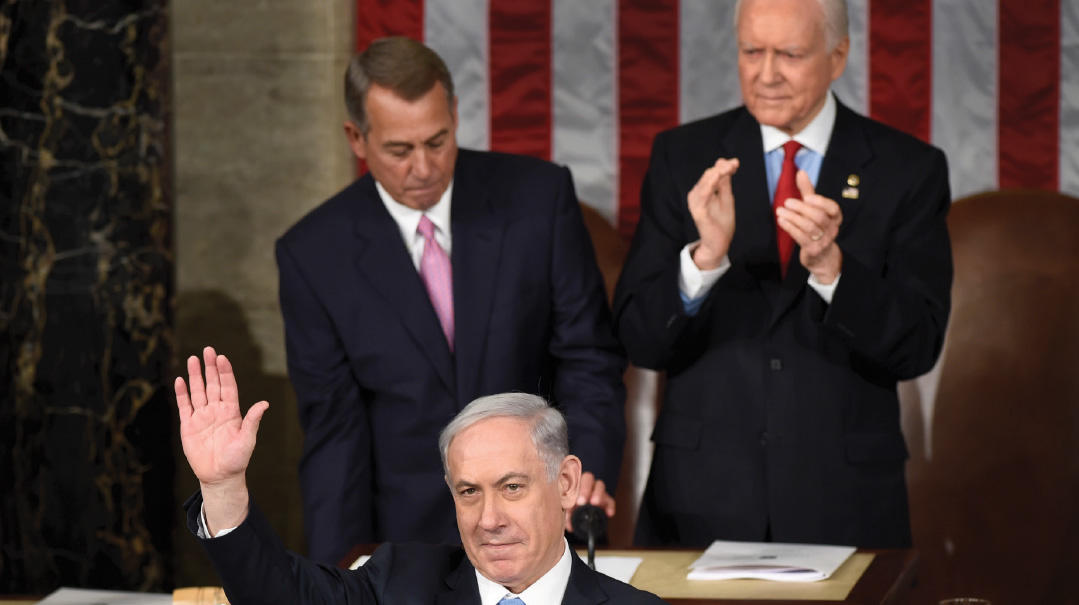Benny Gantz, Political Warrior

Senior IDF colleagues decipher the enigma of Israel’s next prime minister

Benny Gantz is a sucker. Benny Gantz is a genius. Benny Gantz is a warrior. Benny Gantz is a rudderless leader.
All of these descriptors have been applied to Gantz, the Knesset speaker and future prime minister, over the past year as he ran for public office. In the immediate aftermath of his deal with Prime Minister Binyamin Netanyahu, which will see him take over the top spot in the Israeli government for 18 months, and promises his party the key ministerial posts of foreign affairs and justice, he was additionally called a traitor to his cause by his former allies and a unifier like no other Israeli leader of the past by his partners.
But what’s the truth? To find out, we conducted a handful of interviews with top military and political leaders who know Gantz best. How did he perform on the battlefield as a soldier? As army chief of staff, was he a skilled tactician? What is likely to be his management style once he becomes prime minister? Does he really have a chance to overshadow Binyamin Netanyahu, Israel’s longest-serving prime minister and master politician?
As we researched this article, we were repeatedly struck by the contrast between Gantz’s impressive performance on the battlefield and his indecisiveness at the conference table. As a solider and field commander, Gantz is remembered as a courageous soldier who took part in innumerable actions in enemy territory. But when it came to the air-conditioned conference room, to the clamorous debates in which a commander needs to thump the table with his fist, quiet down the dissenting voices and decide on the path forward, sources said that Gantz was always more than willing to let others make the decisions. One example cited by sources: In 2014, when Gantz was chief of staff and the Israeli army was engaged in a showdown with Hamas that would become known as Operation Protective Edge, Gantz went along with Netanyahu in concealing information that Hamas had dug dozens of tunnels along the Gaza border. That decision was later harshly criticized by cabinet members, especially Naftali Bennett, who claimed that early destruction of the tunnels could have saved soldiers’ lives in the ensuing war. Another example: Gantz’s nickname in the army was “Benny-chuta” (benichuta, Hebrew for “tranquilly”), and some of his associates say that this quality has been double-edged.
However, after years in which one man — Binyamin Netanyahu — dominated Israel’s political field, Gantz has finally succeeded in doing what other men could not. Despite the constant attacks from his opponents, Gantz formed an independent party, and for the first time in a decade, presented a real alternative to the leadership of the right under Netanyahu. His friend, Brigadier General Giora Anbar, didn’t believe Gantz would enter politics altogether.
“It isn’t our home field, and it’s not just that it’s unfamiliar to us, the rules of the game often go completely contrary to what we learned in the army,” he said. “But out of his deep sense of patriotism and his recognition that you need to contribute and give of yourself, the man entered politics, formed his own party, and has survived three election campaigns that were characterized by the most outrageous smears against him.
“So it has to be said to those who criticize him,” continues Anbar, “that this is what proves his worthiness to lead more than anything. So when they talk about indecisiveness and procrastination, all you have to do is look at the past year to understand that this is total nonsense.”
Leaving his greatest compliment for last, Anbar describes Gantz as “an outstandingly moral officer.”
“I always saw him as a role model in terms of integrity, personal example, and willingness to give of himself. He was an officer who got his soldiers to follow him, not because they feared him, but because they loved and admired him, and that’s important.”
A Son of Survivors
Benny Gantz grew up in Moshav Kfar Achim, near Ashdod. His mother was a Holocaust survivor from Hungary and his father smuggled into the nascent Jewish state from Romania. Gantz entered the military in 1977 and served in the paratrooper’s unit, becoming a company commander and fighting in the First Lebanon War.
Gantz was appointed head of the Lebanon Liaison Unit during Israel’s withdrawal in 2000, and led Israeli forces as commander of the Judea and Samaria Division in 2001. He left his post as general of the Northern Command nine months before the outbreak of the Second Lebanon War in 2006. In 2007, Gantz was appointed Israel’s military attaché to the United States, a position considered a last stop before retirement. But Gantz achieved the unlikely by returning to Israel as the army’s deputy chief of staff two years later. In 2011, he was appointed chief of the general staff of the IDF, a position he occupied for four years.
Service in Lebanon
During the 1999 election campaign, former chief of staff Ehud Barak’s central campaign promise was to withdraw Israel’s forces from south Lebanon. The high Israeli casualty rate had led many in Israel to believe that it should abandon the effort for good.
Barak was elected, and duly ordered the IDF to begin preparations for withdrawal by 2000. During this time, the South Lebanese Army, Israel’s ally that had battled Hezbollah alongside the IDF, asked for protection or repatriation from Israel after the withdrawal. Gantz, at the time head of the Lebanon Liaison Unit, did not inform the SLA that Israel would be withdrawing prior to the scheduled date. A short while later, thousands of SLA soldiers and their families stood at the border pleading to be allowed into Israel. When asked later why he didn’t inform the SLA, Gantz dismissed claims that he misled them. There was a concern that if the SLA found out about Israel’s withdrawal, they might join Hezbollah.
Sources describe Gantz as a “mensch,” a decent, honest man. So how did Gantz lie so barefacedly to allies who had loyally fought alongside Israel for years? According to Noam Ben Zvi, former brigade commander in the Lebanon Liaison Unit, Gantz didn’t exactly lie to the SLA commanders. “The withdrawal was a sudden retreat, not a withdrawal. It happened on the spur of the moment, a month and a half before the original date.” As proof of this, he cites the fact that he himself was in the United States at the time of the withdrawal, even though he was directly responsible for forces on the ground. “Benny allowed me to leave because there was still a long time before the planned pullout and no one thought we would retreat before then. We were all taken by surprise.”
Two decades after the betrayal, SLA commanders find it difficult to blame the commander who oversaw the withdrawal. Despite the brutal end of the relations between the IDF and the SLA, they praise the cooperation that preceded it. Former SLA commanders living in Israel described Gantz as an officer and a gentleman who always knew how to smooth out the differences between the IDF and the SLA. “With his inner calm, Benny knew how to conduct meetings in such a way that in the end everyone felt like they got what they wanted,” says a former SLA figure.
Too Soft?
Views differ about Gantz’s days as head of the Judea and Samaria Division. His critics claim that he demonstrated weakness against Palestinian violence, especially in Beit Jala, when Palestinian terrorists regularly fired into Israel. Rather than invade the Palestinian city to root out the terror infrastructure, the IDF only returned fire.
One IDF general tells us that as soon as Gantz was replaced by Brigadier General Yitzchak Nachshoni, everything was different. “As soon as Nachshoni came along, the IDF became much more aggressive and employed much greater firepower,” he says. “We took the initiative to an unprecedented degree compared to what came before.”
On the other hand, Brigadier General Harel Kanfu, who joined the division at the same time as Nachshoni, says the fault doesn’t lie with Gantz at all. “The forces he had at his disposal,” he says, “were one-quarter of the forces that were later deployed to the area, and then they say he failed. What do you mean, he failed? Israel failed. Everyone failed.”
During Gantz’s tenure as head of the Judea and Samaria division, Major General Noam Tivon was the brigade commander in charge of Chevron. He is personally outraged to hear claims of Gantz’s weakness. “Let me tell you something about Benny Gantz and then we’ll see if you think he’s weak and indecisive,” he says. “When I was the brigade commander in Chevron, it was a very turbulent time. There were shooting incidents every evening both in the city itself and on the road to Bayt Jibrin. There’s a bridge there called ‘Chalchul Bridge,’ and according to Oslo the top part of the bridge belonged to the Palestinians while the bottom part belonged to Israel. This was before Operation Defensive Shield [2002] and almost every evening shots were fired from above at the Israeli cars passing below. We were breaking our heads for a solution. One evening Benny tells me that he wants to go down and see the situation for himself.
“We were driving along the road under Chalchul Bridge when shots were fired at us. I was driving, Benny was in the front seat beside me, and our radio monitor and a guard were sitting in the back of the vehicle. I stopped the jeep at the side of the road to identify the source of the gunfire, but by the time I stopped, Benny had jumped out of the jeep and begun firing back. I jumped out and together we stormed the terrorists’ position.
“This is something I saw personally, but being exposed to enemy fire was a regular situation for Gantz. From when he was a young paratroop commander, he has been in the line of fire continually. He had countless encounters with the enemy both as a lower ranking commander and as a senior commander. So when you’re talking about a man who charged at terrorists so many times throughout his life, you see he’s anything but ‘indecisive.’ ”
Second Lebanon War
When it comes to Gantz’s measures against Hezbollah as head of the Northern Command, nobody doubts that his conduct was above reproach. What has come into question is whether he left his troops in a state of readiness for war. It didn’t happen on his watch, but nine months after his post as head of the Northern Command, two Israeli soldiers, Eldad Regev and Udi Goldwasser, were kidnapped by Hezbollah, an event that would trigger the Second Lebanon War.
When the war ended, Chief of Staff Dani Chalutz resigned, head of the Northern Command Udi Adam resigned, Deputy Chief of Staff Moshe Kaplinsky, a leading contender for next chief of staff, lost the job, and somehow only Gantz escaped accountability and was sent off to Washington as a military attaché.
If you ask Colonel Gadi Meiri, who was at that time a brigade commander in the Northern Command, it wasn’t Udi Adam who was responsible for the war’s failures. In his view, Gantz didn’t prepare for such an eventuality and the soldiers didn’t train properly throughout his tenure. When asked why Gantz’s name doesn’t figure prominently in the Winograd Commission report, which looked into the failures of the war, he replies: “That’s Benny’s greatness. He’s always been bulletproof.”
But Brigadier General Harel Kanfu, who served as commander of a paratroop battalion during the war, comes to Gantz’s defense on this subject as well. “It’s not that Benny didn’t conduct training,” he says. “The army didn’t conduct training. We didn’t prepare operational plans because we didn’t think there would be a war, and it isn’t worth it to waste money on operational plans that won’t be used.”
Why Didn’t He Destroy the Tunnels?
It’s hard to find people who dislike Benny Gantz. There’s a general consensus that he’s an agreeable person who shies away from unnecessary conflict. The one oft-repeated criticism is that he’s too hesitant, and takes too long to reach decisions. That alleged indecisiveness came to light during Operation Protective Edge in 2014.
In an interview with Mishpacha last year, Defense Minister Naftali Bennett harshly criticized Gantz, chief of staff at the time of the operation. “For months before the operation, the Shin Bet was giving us intelligence about the terror tunnel threat,” he said. “Completely inexplicably, the chief of staff didn’t prepare a plan for eliminating the tunnels. There were 30 terror tunnels ready to unleash a terror attack such as Israel has never seen before, and you, as chief of staff of the IDF, didn’t prepare a plan for eliminating them?!”
In his defense, Gantz believed the tunnels should be destroyed, but, characteristically, he failed to assert himself against the prime minister. In a discussion held two months before Protective Edge, Gantz warned Netanyahu about the tunnel threat and asked him to raise the issue with the cabinet. For his own reasons, the prime minister declined and concealed that information. As a matter of fact, Gantz proposed a four-pronged operation against the terror tunnels to Netanyahu and then-Defense Minister Moshe Yaalon, but the two rejected it. A few days later he again proposed a strike and he was once more blocked by the political leadership. In short, he did show initiative but when he was refused, he acquiesced.
Shrewd after All
However he is described and has performed in the past, last week Benny Gantz managed what many before him had failed to achieve: a date, enshrined in law, for Prime Minister Netanyahu to depart from office.
It’s easy to say that Netanyahu won’t fulfill the agreement, as has happened before. However, this time the deal will be enshrined in law. At the same time that Netanyahu’s is sworn in for a fifth term, Gantz will be sworn in for his first term. If Netanyahu decides to dissolve the Knesset and go to elections earlier than the agreed-upon three years, Gantz will automatically become prime minister in the interval before the elections, a minimum of six months. And if you’re asking yourself why on earth Netanyahu agreed to step down in a year and a half despite the polls showing him handily winning reelection — there are two answers: one, the economic recession analysts are predicting. Two, the plea bargain he hopes to achieve — with the help of Benny Gantz. And the winner? Again, Benny Gantz.
(Originally featured in Mishpacha, Issue 808)
Oops! We could not locate your form.













